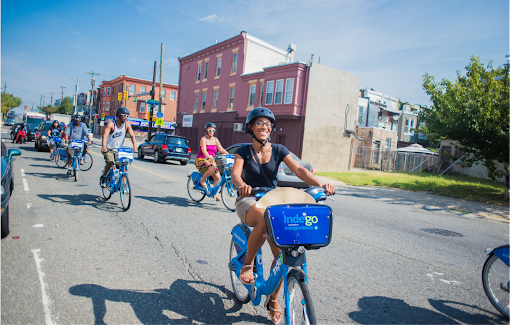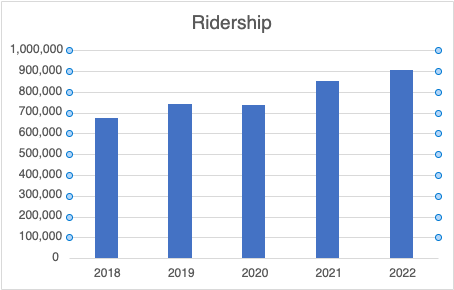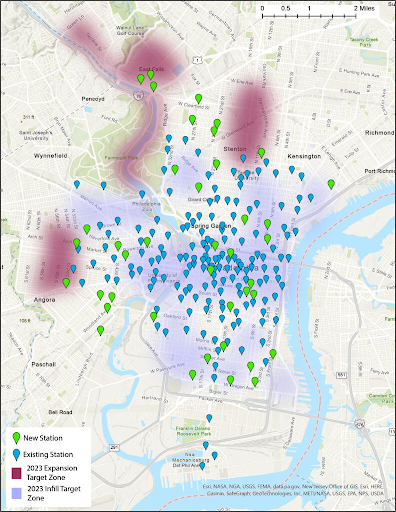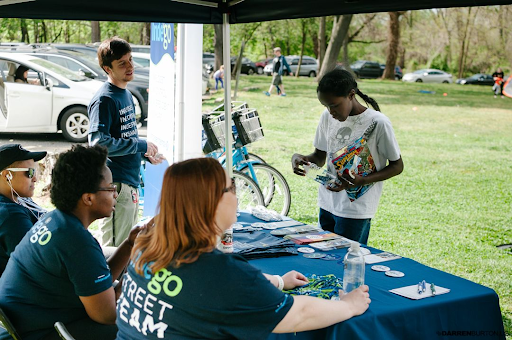Promoting Community Engagement and Equity in Bikeshare: A Look at Indego's 5 Year Equity Plan
20 minutes Author: Shared-Use Mobility Center Date Launched/Enacted: Apr 11, 2023 Date Published: April 11, 2023

Since 2021, the Shared-Use Mobility Center (SUMC) has convened an Innovative Transit Micromobility Integration (ITMI) working group, in partnership with the Federal Transit Administration (FTA). In these working group meetings, representatives from transit agencies discuss challenges and strategies they face in integrating micromobility programs into their transit systems, and share knowledge and resources to learn from each others’ experiences. This case study is part of SUMC’s technical assistance work for the FTA that is conducted under the Mobility Innovation Collaborative program, and incorporates knowledge gained from a guest presentation at one of these working group meetings.

Watch a presentation about Indego from Waffiyyah Murray, Indego Program Manager with the City of Philadelphia
Credit: SUMC
Introduction
As a first and last mile solution, bikeshare can help fill gaps in transportation networks and provide communities with better, more reliable, and more affordable transportation access. Bikeshare can help connect people with employment, education, social services, and other community services. To ensure that bikeshare can fulfill this important role as effectively as possible, equity should be a driving force in bikeshare operations. Indego, the City of Philadelphia’s bikeshare program, has prioritized equity since its start in 2015 and has published a 5 Year Equity Plan to drive system expansion through a focus on access, representation, inclusion, and community engagement.
History and Operations
Indego began operations in 2015, with 600 bikes and 60 stations distributed around Philadelphia. The system is owned by the City of Philadelphia, and operated by Bicycle Transit Systems, a private bikeshare company, with bikes provided by B-Cycle and with Independence Blue Cross as its main sponsor.

Chart of Indego ridership growth from 2018 to 2022. Credit: Indego
With a record of over 6.5 million rides as of 2023, Indego’s success has led to a number of expansion efforts. Indego currently has over 200 stations throughout Philadelphia and more than 2,000 bikes, and is in the middle of a five-year system-wide expansion, set to be completed in 2025. Through this expansion, Indego plans on increasing the fleet size to 3,500 bikes, half of which will be pedal-assist e-bikes, doubling the number of docking stations, and reaching more communities in South, West, North, and Northwest Philadelphia.

Map showing the status of Indego’s expansion as of 2023. Credit: Indego
Indego’s 5 year Equity Plan
The City of Philadelphia has been a long standing proponent of equity in micromobility. Prior to launching Indego, Philadelphia was a founding partner of the Better Bike Share Partnership (BBSP), a consortium of government agencies, non-profits, and planners that work to understand barriers to shared micromobility in low-income and BIPOC communities and work to improve access. That partnership helped guide Indego’s creation, and Philadelphia became the first BBSP Living Lab city, a testing ground to determine best practices in micromobility programs and develop strategies to address barriers.
In February, 2023, the City of Philadelphia enacted a 5 Year Equity Plan, with contributions from Bicycle Transit, to drive the system’s growth in an equitable manner. The plan builds on Indego’s equity initiatives work and works to increase “access to affordable mobility options for people regardless of their race, ethnicity, income, gender, age, sexual orientation, primary language, immigration status, or other markers of social identity.” At the forefront of Indego’s plan are 5 specific equity-related goals:
- Indego will improve transportation access for all people, with particular attention to people who are BIPOC and people facing economic challenges.
- Indego’s pricing structure will make the system financially accessible to people with economic challenges.
- Indego will reduce non-financial barriers to ridership and barriers to entry, especially in underserved communities and among all eligible age groups, including seniors 62+ and youth 14 – 21.
- Indego will continue to prioritize community partnerships and relationships so that marginalized communities have the ability to influence decisions related to Indego in a way that addresses their needs and concerns.
- Indego’s workforce, including its managing team at both BTS and OTIS, will include demographic diversity and diverse perspectives and experiences.
Defining Equity
Equity is often a difficult term to fully define, and different perspectives on the meaning of equity can produce different strategies for addressing it. Thus, a key aspect of Indego’s equity plan was producing a shared definition of equity with input from both the City of Philadelphia and Bicycle Transit that was understood and agreed upon by both parties. These efforts produced the following definition:
“An equitable bike share system is one that increases access to affordable mobility options for people regardless of their race, ethnicity, income, gender, age, sexual orientation, primary language, immigration status, or other markers of social identity. As an equitable bike share program, Indego is planned and operated so that people from marginalized communities have the ability to influence decisions in a way that addresses their needs and concerns.”
The definition gives Indego a reference point to refer to as system expansion progresses, ensuring that Indego’s work incorporates the shared understanding of equity.
Community Outreach and Engagement
Community input is the cornerstone of Indego’s expansion strategy, and Indego is deliberate in its community engagement strategy to ensure meaningful and impactful community involvement. One part of this strategy is to focus on listening and learning from communities on what attitudes community members have towards bikeshare, what barriers exist, and what needs can be addressed. Historically, many transportation initiatives in Philadelphia have furthered segregation and limited connectivity for some communities. Given this history, many communities have a mistrust of government institutions, particularly ones involved with transportation projects. Thus building trust is at the forefront of Indego’s equity initiatives. Trust building involves planning with communities rather than planning for them, incorporating feedback, and following through with stated plans.
Indego has various group rides, educational programs, and other community outreach initiatives, including Wheels to Work, a workforce development training course to learn more about bicycling and bikeshare and the Community Ambassador Program where community leaders organize group rides, participate in outreach events, and serve as a liaison to Indego for their community.

Indego staff at a community outreach event. Credit: Darren Burton Photography
Conclusion
As Indego moves forward with implementing the 5 Year Equity Plan, staff will continue to refine data collection efforts and to be able to best measure how effective their equity work is. Indego is working to better identify barriers and drive changes throughout the expansion through hosting focus group discussions, engaging with new partners and riders, and researching new grant funding opportunities. Finally, Indego will organize an Advisory Council, staffed by key community partners, to meet regularly with the city and work to provide insights and feedback on the system and the bikeshare’s equity efforts. Through these efforts, Indego hopes to make the 5 Year Equity Plan as successful as possible and continue being a leader in equitable bikeshare.